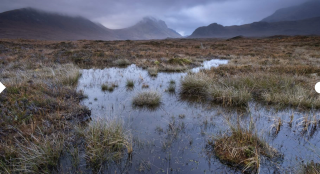Thought leadership
- Date 02 February 2024
- Words by Parisa Rahnama
- Reading time 1 mins
World Wetlands Day – 2nd February 2024
Parisa Rahnama, investment manager in our Natural Capital Strategy team, shares some facts and insights on World Wetlands Day

Today, as the world marks World Wetlands Day, at Climate Asset Management, we acknowledge the importance of wetlands providing invaluable ecosystems that support biodiversity, carbon storage and flood control.

Wetlands occur wherever water meets land. Article 1.1 of the Ramsar Convention on Wetlands defines wetlands as: “areas of marsh, fen, peatland or water, whether natural or artificial, permanent or temporary, with water that is static or flowing, fresh, brackish or salt.”[1] These unique habitats include mangroves, peatlands, marshes, rivers and lakes, deltas, flooded forests, rice fields and coral reefs (when near to the surface).
Wetlands play a key role in mitigating the impacts of climate change and biodiversity loss including flood and coastal protection, water purification, and climate regulation. Wetlands contain a disproportionate amount of the Earth’s total soil carbon, holding between 20 and 30% of all land-based carbon despite occupying only 5–8% of its land surface[2]. Wetlands are currently estimated to cover more than 12.1 million km2, an area greater than Greenland[3]. Additionally, wetlands provide a rich biodiversity habitat. Approximately 40% of the world’s plant and animal species depend on wetlands, including 30% of all fish species[4].
“ Wetlands contain a disproportionate amount of the Earth’s total soil carbon, holding between 20 and 30% of all land-based carbon despite occupying only 5–8% of its land surface”
Despite the important role wetlands play in the broader context of climate and ecosystem sustainability, they are some of the most threatened habitats in the world. Currently, 25% of wetland species are at risk of extinction. Approximately 87% of the world’s wetlands have been lost in the last 300 years, with 35% lost since 1970[5]. Wetlands are disappearing three times faster than forests.
The catastrophic loss of wetlands is being accelerated due to various factors, including climate change, water drainage, pollution, and unsustainable use for agriculture. Invasive species, disrupted flows from dams and sediment dumping from deforestation and soil erosion upstream further contribute to this alarming trend.
“ Wetlands are disappearing three times faster than forests.”
In the world of nature-based solutions, there is an understandable focus on trees and forests for the carbon they can store. However, there is a gradual recognition of the value of wetlands. The slow pace of investments in wetlands restoration presents a significant challenge to their conservation and sustainable management, potentially leading to a greater loss of these vital ecosystems.
At Climate Asset Management, wetlands are a key focus area for restoration and conservation in both our Natural Capital Strategy and Nature Based Carbon Strategy.

Our team is currently evaluating opportunities for wetlands restoration investments across different geographies, including peatlands in the UK and mangroves in Asia. We hope to partner with scientists and researchers to contribute new learnings to the global conversation of wetlands.
It is through the protection and restoration of wetlands in the broader ecosystem agenda, that we hope to ensure that our planet continues to thrive today and in the future.
[1] Ramsar Convention on Wetlands
[2] https://www.nature.com/articles/ncomms13835 / Mitsch, W. J. & Gosselink, J. G. in Wetlands 4th edn Wiley (2007)
[3] https://unfccc.int/news/wetlands-disappearing-three-times-faster-than-forests
[4] Ramsar Convention Biodiversity Factsheet
[5] https://unfccc.int/news/wetlands-disappearing-three-times-faster-than-forests

